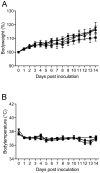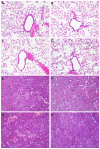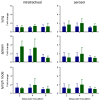The Middle East respiratory syndrome coronavirus (MERS-CoV) does not replicate in Syrian hamsters - PubMed (original) (raw)
. 2013 Jul 2;8(7):e69127.
doi: 10.1371/journal.pone.0069127. Print 2013.
Joseph Prescott, Laura Baseler, Trenton Bushmaker, Tina Thomas, Matthew G Lackemeyer, Cynthia Martellaro, Shauna Milne-Price, Elaine Haddock, Bart L Haagmans, Heinz Feldmann, Vincent J Munster
Affiliations
- PMID: 23844250
- PMCID: PMC3699510
- DOI: 10.1371/journal.pone.0069127
The Middle East respiratory syndrome coronavirus (MERS-CoV) does not replicate in Syrian hamsters
Emmie de Wit et al. PLoS One. 2013.
Abstract
In 2012 a novel coronavirus, MERS-CoV, associated with severe respiratory disease emerged in the Arabian Peninsula. To date, 55 human cases have been reported, including 31 fatal cases. Several of the cases were likely a result of human-to-human transmission. The emergence of this novel coronavirus prompts the need for a small animal model to study the pathogenesis of this virus and to test the efficacy of potential intervention strategies. In this study we explored the use of Syrian hamsters as a small animal disease model, using intratracheal inoculation and inoculation via aerosol. Clinical signs of disease, virus replication, histological lesions, cytokine upregulation nor seroconversion were observed in any of the inoculated animals, indicating that MERS-CoV does not replicate in Syrian hamsters.
Conflict of interest statement
Competing Interests: The authors have declared that no competing interests exist.
Figures
Figure 1
Body weight and temperature in Syrian hamsters inoculated with MERS-CoV isolate HCoV-EMC/2012.
Figure 2
Histological analysis of lungs and kidney of Syrian hamsters inoculated with MERS-CoV isolate HCoV-EMC/2012.
Figure 3
Mx2 gene expression in hamsters after inoculation with MERS-CoV isolate
Figure 4
Presence of DPP4 in hamster lung and kidney.
Similar articles
- An animal model of MERS produced by infection of rhesus macaques with MERS coronavirus.
Yao Y, Bao L, Deng W, Xu L, Li F, Lv Q, Yu P, Chen T, Xu Y, Zhu H, Yuan J, Gu S, Wei Q, Chen H, Yuen KY, Qin C. Yao Y, et al. J Infect Dis. 2014 Jan 15;209(2):236-42. doi: 10.1093/infdis/jit590. Epub 2013 Nov 11. J Infect Dis. 2014. PMID: 24218506 Free PMC article. - Animal models of Middle East respiratory syndrome coronavirus infection.
van Doremalen N, Munster VJ. van Doremalen N, et al. Antiviral Res. 2015 Oct;122:28-38. doi: 10.1016/j.antiviral.2015.07.005. Epub 2015 Jul 17. Antiviral Res. 2015. PMID: 26192750 Free PMC article. Review. - Acute Respiratory Infection in Human Dipeptidyl Peptidase 4-Transgenic Mice Infected with Middle East Respiratory Syndrome Coronavirus.
Iwata-Yoshikawa N, Okamura T, Shimizu Y, Kotani O, Sato H, Sekimukai H, Fukushi S, Suzuki T, Sato Y, Takeda M, Tashiro M, Hasegawa H, Nagata N. Iwata-Yoshikawa N, et al. J Virol. 2019 Mar 5;93(6):e01818-18. doi: 10.1128/JVI.01818-18. Print 2019 Mar 15. J Virol. 2019. PMID: 30626685 Free PMC article. - Coronaviruses exploit a host cysteine-aspartic protease for replication.
Chu H, Hou Y, Yang D, Wen L, Shuai H, Yoon C, Shi J, Chai Y, Yuen TT, Hu B, Li C, Zhao X, Wang Y, Huang X, Lee KS, Luo C, Cai JP, Poon VK, Chan CC, Zhang AJ, Yuan S, Sit KY, Foo DC, Au WK, Wong KK, Zhou J, Kok KH, Jin DY, Chan JF, Yuen KY. Chu H, et al. Nature. 2022 Sep;609(7928):785-792. doi: 10.1038/s41586-022-05148-4. Epub 2022 Aug 3. Nature. 2022. PMID: 35922005 - [Advances in the Animal Models of MERS-CoV].
Lan J, Deng Y, Tan W. Lan J, et al. Bing Du Xue Bao. 2016 May;32(3):369-75. Bing Du Xue Bao. 2016. PMID: 29963837 Review. Chinese.
Cited by
- Infection with mpox virus via the genital mucosae increases shedding and transmission in the multimammate rat (Mastomys natalensis).
Port JR, Riopelle JC, Smith SG, Myers L, Kaiser FK, Lewis MC, Gallogly S, Okumura A, Bushmaker T, Schulz JE, Rosenke R, Prado-Smith J, Carmody A, Bane S, Smith BJ, Saturday G, Feldmann H, Rosenke K, Munster VJ. Port JR, et al. Nat Microbiol. 2024 May;9(5):1231-1243. doi: 10.1038/s41564-024-01666-1. Epub 2024 Apr 22. Nat Microbiol. 2024. PMID: 38649413 - Preclinical evaluation of manufacturable SARS-CoV-2 spike virus-like particles produced in Chinese Hamster Ovary cells.
Alpuche-Lazcano SP, Stuible M, Akache B, Tran A, Kelly J, Hrapovic S, Robotham A, Haqqani A, Star A, Renner TM, Blouin J, Maltais JS, Cass B, Cui K, Cho JY, Wang X, Zoubchenok D, Dudani R, Duque D, McCluskie MJ, Durocher Y. Alpuche-Lazcano SP, et al. Commun Med (Lond). 2023 Aug 23;3(1):116. doi: 10.1038/s43856-023-00340-7. Commun Med (Lond). 2023. PMID: 37612423 Free PMC article. - Animal models for studying coronavirus infections and developing antiviral agents and vaccines.
Lin Q, Lu C, Hong Y, Li R, Chen J, Chen W, Chen J. Lin Q, et al. Antiviral Res. 2022 Jul;203:105345. doi: 10.1016/j.antiviral.2022.105345. Epub 2022 May 21. Antiviral Res. 2022. PMID: 35605699 Free PMC article. Review. - Review of selected animal models for respiratory coronavirus infection and its application in drug research.
Qin S, Li R, Zheng Z, Zeng X, Wang Y, Wang X. Qin S, et al. J Med Virol. 2022 Jul;94(7):3032-3042. doi: 10.1002/jmv.27718. Epub 2022 Mar 24. J Med Virol. 2022. PMID: 35285034 Free PMC article. Review. - Comparison of Experimental Middle East Respiratory Syndrome Coronavirus Infection Acquired by Three Individual Routes of Infection in the Common Marmoset.
Nelson M, O'Brien LM, Davies C, Keyser E, Butcher W, Smither SJ, Nunez A, Salguero FJ, Lever MS. Nelson M, et al. J Virol. 2022 Feb 23;96(4):e0173921. doi: 10.1128/JVI.01739-21. Epub 2021 Dec 15. J Virol. 2022. PMID: 34908447 Free PMC article.
References
- Zaki AM, van Boheemen S, Bestebroer TM, Osterhaus AD, Fouchier RA (2012) Isolation of a novel coronavirus from a man with pneumonia in Saudi Arabia. N Engl J Med 367: 1814-1820. doi:10.1056/NEJMoa1211721. PubMed: 23075143. - DOI - PubMed
- WHO (2013) Coronavirus infections. http://www.who.int/csr/don/archive/disease/coronavirus_infections/en/ind....
- Annan A, Baldwin HJ, Corman VM, Klose SM, Owusu M et al. (2013) Human betacoronavirus 2c EMC/2012-related viruses in bas, Ghana and Europe. Emerg Infect Dis 19: 456-459. doi:10.3201/eid1903.121503. PubMed: 23622767. - DOI - PMC - PubMed
Publication types
MeSH terms
Substances
LinkOut - more resources
Full Text Sources
Other Literature Sources



